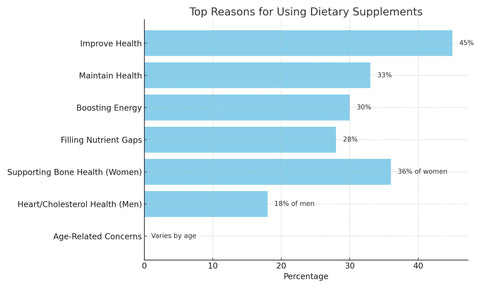Supplements have moved from niche products to mainstream must-haves for many Americans. But how widespread is their use? From boosting immunity to bridging nutritional gaps, let's dive into the numbers and uncover the reasons driving the popularity of dietary supplements across the nation.
How Many Americans Take Supplements?
-
Three-Quarters Take Them: Recent surveys reveal that a whopping 74% of American adults use dietary supplements. This number highlights their growing role in modern health routines. (Source: CRN Consumer Survey on Dietary Supplements).
-
Age Matters: Supplement use increases with age. Among adults aged 60 and older, over 80% report taking supplements, compared to around 40% of those between 20 and 39. (Source: CDC)
-
Women Lead the Way: Across all age groups, women are consistently more likely to use supplements than men. (Source: CDC).
-
Multivitamins Reign Supreme: Multivitamin-mineral supplements are the most popular choice among American adults. (Source: CDC).
Why the Surge in Supplement Use?
-
Filling Nutritional Gaps: Many people turn to supplements to ensure they meet recommended daily intakes of vitamins and minerals.
-
Addressing Health Concerns: Targeted supplements are often used to support heart health, immunity, joint health, and more.
-
A Proactive Approach to Wellness: Supplements are seen as a way to optimize overall health and potentially prevent future health issues.
-
Growing Accessibility: The wide availability of supplements in various forms makes them convenient for consumers.
How and Why Americans Choose Supplements?
Primarily, individuals are turning to supplements to "improve" (45%) or "maintain" (33%) their overall health and wellness, as indicated by research published on PubMed and by Penn Medicine. This desire to enhance personal health underscores a proactive approach to wellness, where prevention is prioritized over treatment.
Moreover, the quest for energy boosters is also notable, with 30% of individuals citing this as a key motivator, according to the CRN Consumer Survey. This reflects the fast-paced lifestyle many lead, seeking additional support to meet their daily demands. Close behind, 28% of users aim to fill nutrient gaps in their diet, highlighting an awareness of and desire to rectify dietary deficiencies without overhauling their meals completely.
Gender-specific concerns also play a significant role; 36% of women use supplements to support bone health, while 18% of men focus on heart and cholesterol health, showcasing a targeted approach to supplement usage. Age-related concerns are yet another driver, especially among older adults who are increasingly turning to supplements to address issues like bone, joint, and eye health.

Figure 1: This chart displays the primary reasons individuals turn to dietary supplements, highlighting the emphasis on improving and maintaining health, alongside other specific health benefits.
This pattern of supplement use highlights a broader trend towards individualized health care, where dietary supplements serve as tools for people to address specific health concerns, prevent potential health issues, and enhance their overall quality of life.
Dietary Supplement Usage Patterns in the U.S.
The landscape of dietary supplement usage in the United States presents a fascinating picture of how Americans are taking charge of their health. According to the CRN Consumer Survey and the CDC, between 71-74% of U.S. adults report using dietary supplements, a testament to their popularity. This widespread use is influenced by a variety of demographic factors, including gender, age, education, and income levels, with higher usage reported among women, older adults, and those with higher educational and income backgrounds.
Multivitamins emerge as the most popular choice, a finding echoed by both the CDC and CRN Consumer Survey. This preference underscores the general desire for a comprehensive approach to nutrient intake, ensuring a broad spectrum of vitamins and minerals are consumed. Following multivitamins, vitamin D, vitamin C, calcium, and B vitamins rank as the most consumed supplements, each serving specific health purposes from bone strength to immune support.
This pattern not only reflects the health priorities of the American public but also indicates a nuanced understanding of the role different nutrients play in maintaining health. The discerning use of supplements, aligned with individual health goals and needs, showcases a proactive and informed approach to health maintenance, further solidified by the trust and reliance placed on these health aids.
Important Considerations
-
Not a Cure-All: Supplements should never replace a healthy diet or prescribed medications.
-
Talk to Your Doctor: Consult a healthcare professional before starting any new supplements, especially if you have underlying health conditions or are taking medications.
-
Choose Reputable Brands: Opt for high-quality supplements from trusted manufacturers as those in the Cozy Farm's inventory.
The statistics speak volumes: supplements play a significant role in the lives of millions of Americans. As their popularity continues to rise, it's essential to be informed about safe and effective supplement use.
Are you among the many Americans who take supplements? Share your reasons and experiences in the comments below and browse supplements at Cozy Farm.









